Accounting Theory and Practice: Analyzing Westpac Pay Reforms
VerifiedAdded on 2023/06/13
|5
|950
|444
Essay
AI Summary
This essay analyzes Westpac Banking Corp's pay reforms in light of the Royal Banking Commission's recommendations, applying the ethical branch of stakeholder theory. The analysis examines how Westpac's efforts to address customer complaints and restructure bonus schemes align with the theory's emphasis on protecting stakeholder interests and ensuring fair treatment. The essay references the Royal Commission's findings and Mr. Hartzer's acknowledgements regarding complex products, highlighting the bank's objectives to create beneficial products for customers. The conclusion emphasizes the importance of protecting stakeholder interests and restructuring pay systems, as suggested by the theory and implemented by Westpac.
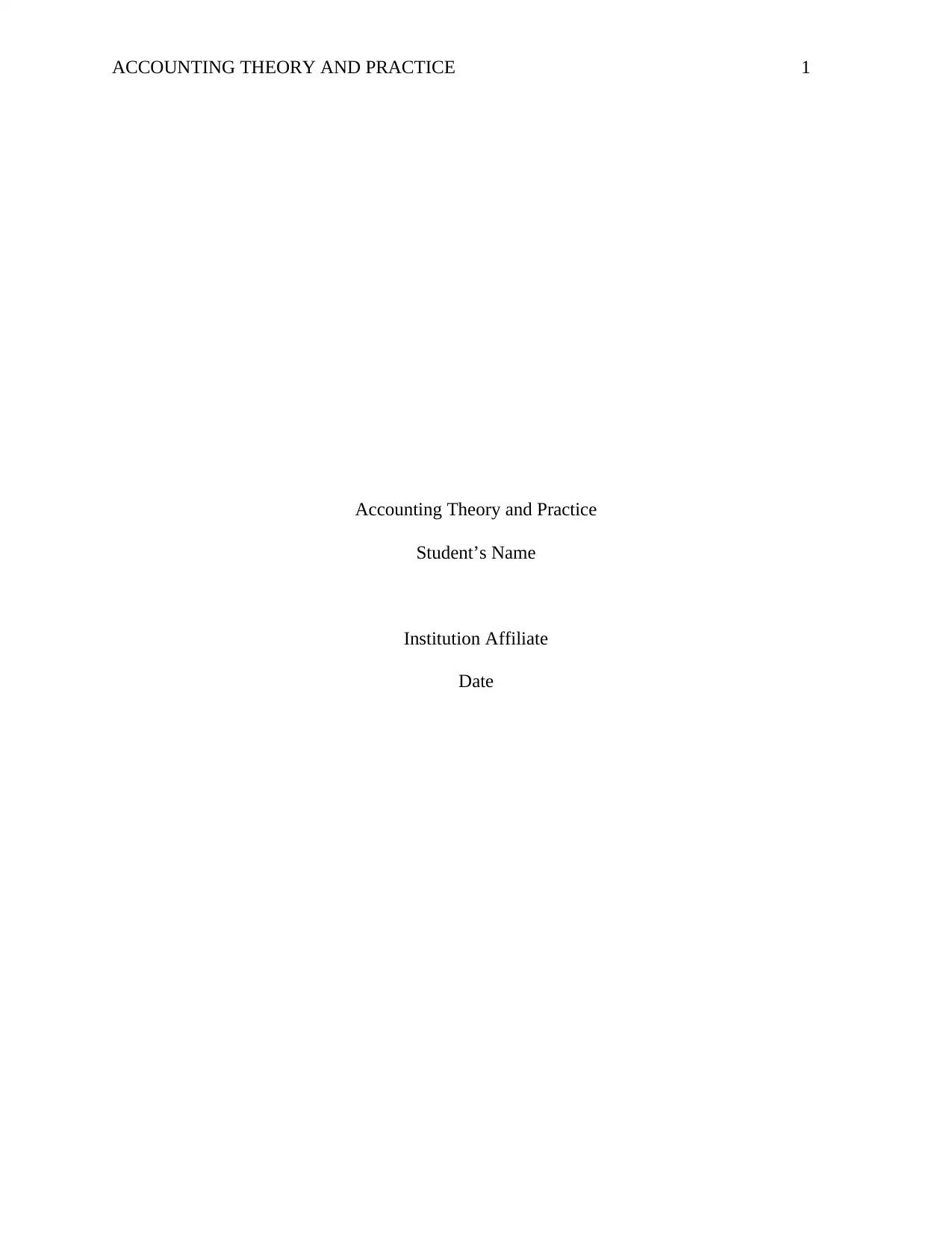
ACCOUNTING THEORY AND PRACTICE 1
Accounting Theory and Practice
Student’s Name
Institution Affiliate
Date
Accounting Theory and Practice
Student’s Name
Institution Affiliate
Date
Paraphrase This Document
Need a fresh take? Get an instant paraphrase of this document with our AI Paraphraser
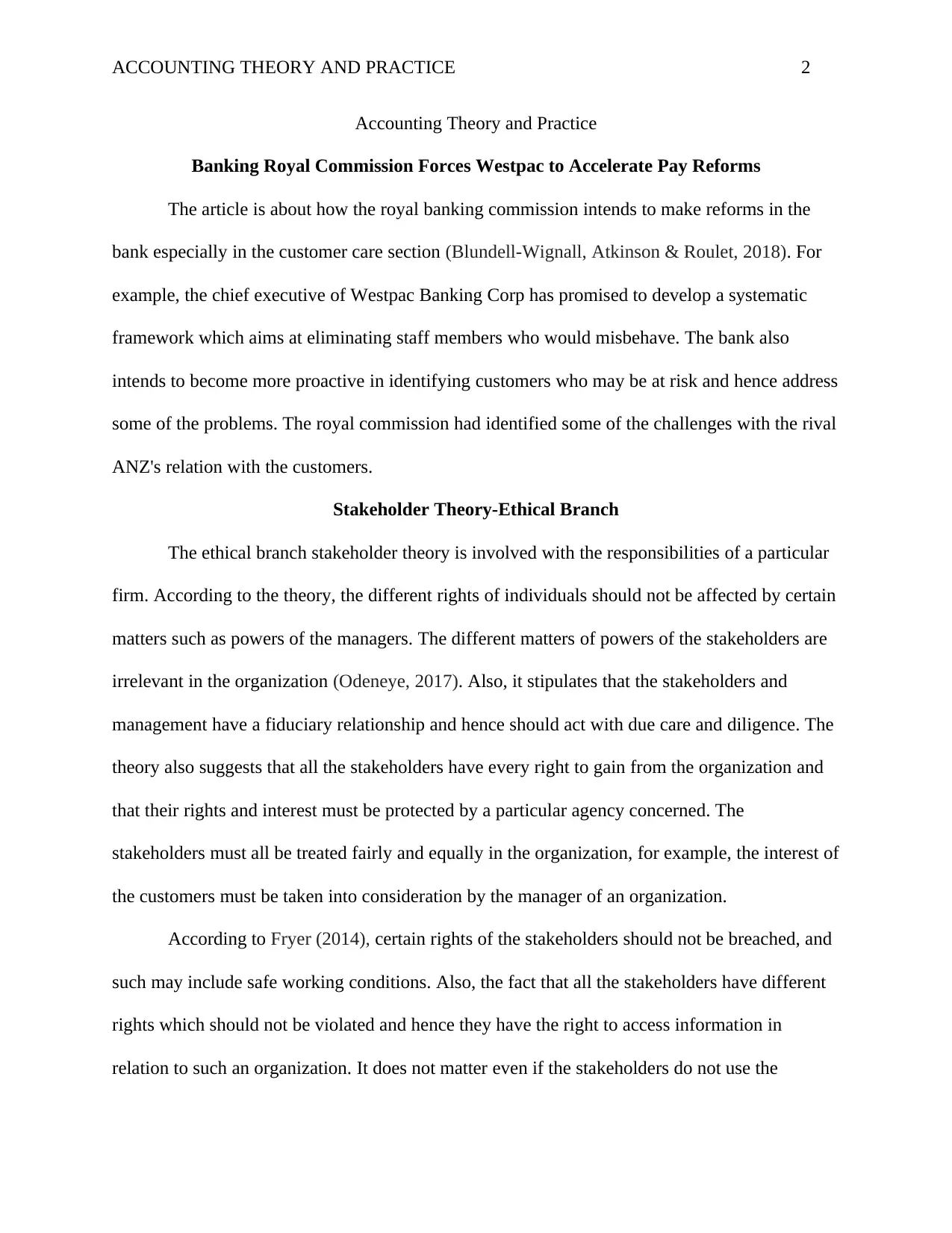
ACCOUNTING THEORY AND PRACTICE 2
Accounting Theory and Practice
Banking Royal Commission Forces Westpac to Accelerate Pay Reforms
The article is about how the royal banking commission intends to make reforms in the
bank especially in the customer care section (Blundell-Wignall, Atkinson & Roulet, 2018). For
example, the chief executive of Westpac Banking Corp has promised to develop a systematic
framework which aims at eliminating staff members who would misbehave. The bank also
intends to become more proactive in identifying customers who may be at risk and hence address
some of the problems. The royal commission had identified some of the challenges with the rival
ANZ's relation with the customers.
Stakeholder Theory-Ethical Branch
The ethical branch stakeholder theory is involved with the responsibilities of a particular
firm. According to the theory, the different rights of individuals should not be affected by certain
matters such as powers of the managers. The different matters of powers of the stakeholders are
irrelevant in the organization (Odeneye, 2017). Also, it stipulates that the stakeholders and
management have a fiduciary relationship and hence should act with due care and diligence. The
theory also suggests that all the stakeholders have every right to gain from the organization and
that their rights and interest must be protected by a particular agency concerned. The
stakeholders must all be treated fairly and equally in the organization, for example, the interest of
the customers must be taken into consideration by the manager of an organization.
According to Fryer (2014), certain rights of the stakeholders should not be breached, and
such may include safe working conditions. Also, the fact that all the stakeholders have different
rights which should not be violated and hence they have the right to access information in
relation to such an organization. It does not matter even if the stakeholders do not use the
Accounting Theory and Practice
Banking Royal Commission Forces Westpac to Accelerate Pay Reforms
The article is about how the royal banking commission intends to make reforms in the
bank especially in the customer care section (Blundell-Wignall, Atkinson & Roulet, 2018). For
example, the chief executive of Westpac Banking Corp has promised to develop a systematic
framework which aims at eliminating staff members who would misbehave. The bank also
intends to become more proactive in identifying customers who may be at risk and hence address
some of the problems. The royal commission had identified some of the challenges with the rival
ANZ's relation with the customers.
Stakeholder Theory-Ethical Branch
The ethical branch stakeholder theory is involved with the responsibilities of a particular
firm. According to the theory, the different rights of individuals should not be affected by certain
matters such as powers of the managers. The different matters of powers of the stakeholders are
irrelevant in the organization (Odeneye, 2017). Also, it stipulates that the stakeholders and
management have a fiduciary relationship and hence should act with due care and diligence. The
theory also suggests that all the stakeholders have every right to gain from the organization and
that their rights and interest must be protected by a particular agency concerned. The
stakeholders must all be treated fairly and equally in the organization, for example, the interest of
the customers must be taken into consideration by the manager of an organization.
According to Fryer (2014), certain rights of the stakeholders should not be breached, and
such may include safe working conditions. Also, the fact that all the stakeholders have different
rights which should not be violated and hence they have the right to access information in
relation to such an organization. It does not matter even if the stakeholders do not use the
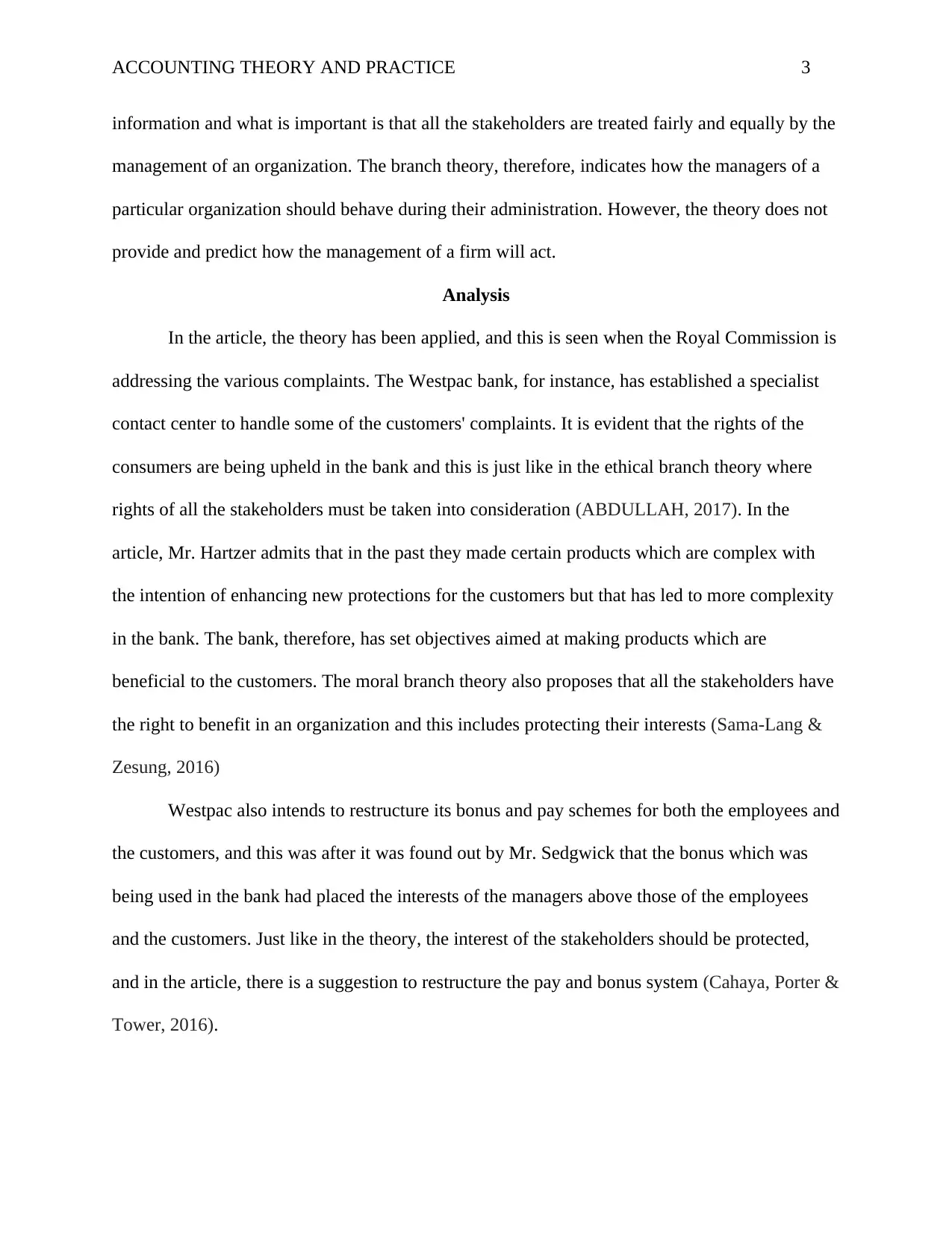
ACCOUNTING THEORY AND PRACTICE 3
information and what is important is that all the stakeholders are treated fairly and equally by the
management of an organization. The branch theory, therefore, indicates how the managers of a
particular organization should behave during their administration. However, the theory does not
provide and predict how the management of a firm will act.
Analysis
In the article, the theory has been applied, and this is seen when the Royal Commission is
addressing the various complaints. The Westpac bank, for instance, has established a specialist
contact center to handle some of the customers' complaints. It is evident that the rights of the
consumers are being upheld in the bank and this is just like in the ethical branch theory where
rights of all the stakeholders must be taken into consideration (ABDULLAH, 2017). In the
article, Mr. Hartzer admits that in the past they made certain products which are complex with
the intention of enhancing new protections for the customers but that has led to more complexity
in the bank. The bank, therefore, has set objectives aimed at making products which are
beneficial to the customers. The moral branch theory also proposes that all the stakeholders have
the right to benefit in an organization and this includes protecting their interests (Sama-Lang &
Zesung, 2016)
Westpac also intends to restructure its bonus and pay schemes for both the employees and
the customers, and this was after it was found out by Mr. Sedgwick that the bonus which was
being used in the bank had placed the interests of the managers above those of the employees
and the customers. Just like in the theory, the interest of the stakeholders should be protected,
and in the article, there is a suggestion to restructure the pay and bonus system (Cahaya, Porter &
Tower, 2016).
information and what is important is that all the stakeholders are treated fairly and equally by the
management of an organization. The branch theory, therefore, indicates how the managers of a
particular organization should behave during their administration. However, the theory does not
provide and predict how the management of a firm will act.
Analysis
In the article, the theory has been applied, and this is seen when the Royal Commission is
addressing the various complaints. The Westpac bank, for instance, has established a specialist
contact center to handle some of the customers' complaints. It is evident that the rights of the
consumers are being upheld in the bank and this is just like in the ethical branch theory where
rights of all the stakeholders must be taken into consideration (ABDULLAH, 2017). In the
article, Mr. Hartzer admits that in the past they made certain products which are complex with
the intention of enhancing new protections for the customers but that has led to more complexity
in the bank. The bank, therefore, has set objectives aimed at making products which are
beneficial to the customers. The moral branch theory also proposes that all the stakeholders have
the right to benefit in an organization and this includes protecting their interests (Sama-Lang &
Zesung, 2016)
Westpac also intends to restructure its bonus and pay schemes for both the employees and
the customers, and this was after it was found out by Mr. Sedgwick that the bonus which was
being used in the bank had placed the interests of the managers above those of the employees
and the customers. Just like in the theory, the interest of the stakeholders should be protected,
and in the article, there is a suggestion to restructure the pay and bonus system (Cahaya, Porter &
Tower, 2016).
⊘ This is a preview!⊘
Do you want full access?
Subscribe today to unlock all pages.

Trusted by 1+ million students worldwide
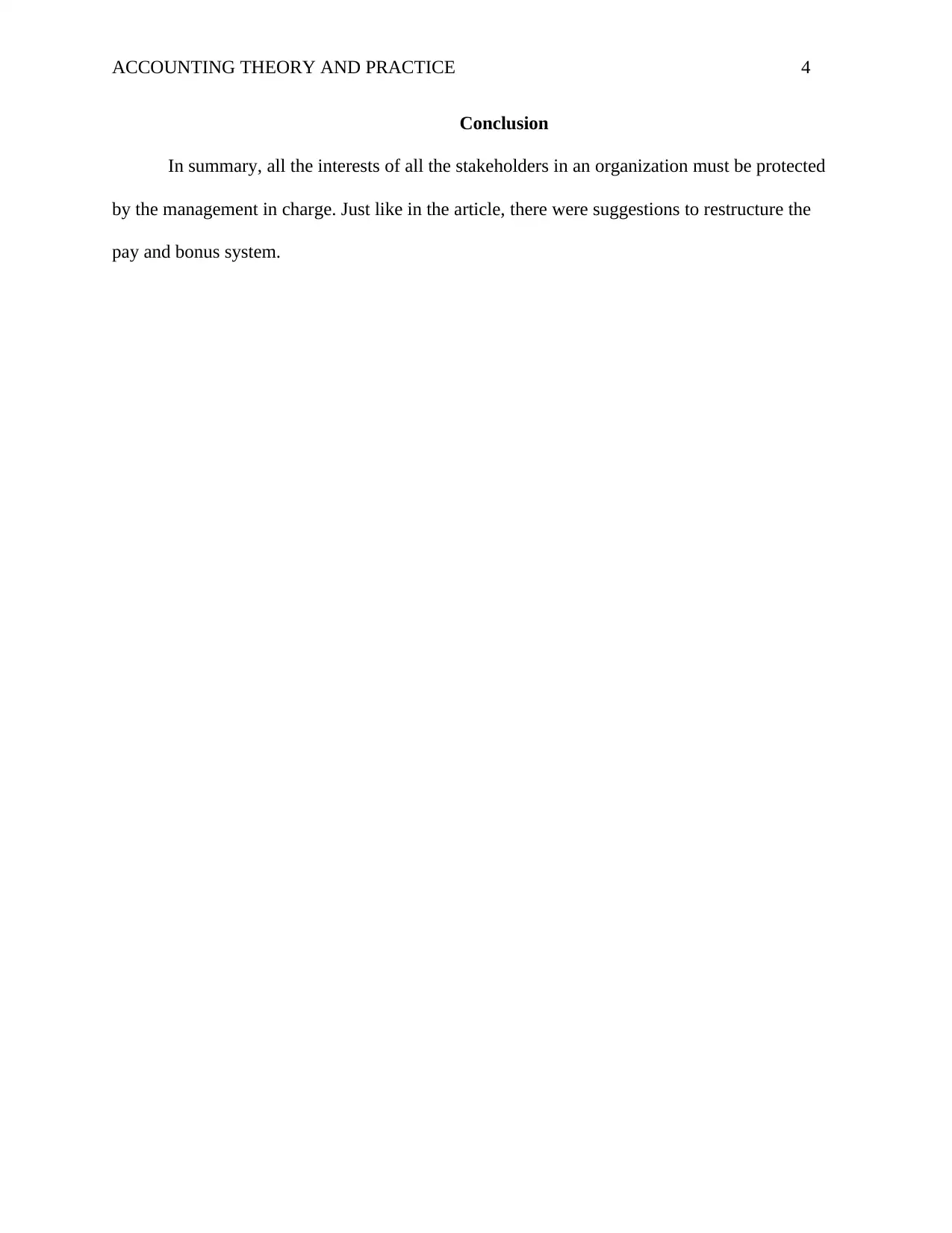
ACCOUNTING THEORY AND PRACTICE 4
Conclusion
In summary, all the interests of all the stakeholders in an organization must be protected
by the management in charge. Just like in the article, there were suggestions to restructure the
pay and bonus system.
Conclusion
In summary, all the interests of all the stakeholders in an organization must be protected
by the management in charge. Just like in the article, there were suggestions to restructure the
pay and bonus system.
Paraphrase This Document
Need a fresh take? Get an instant paraphrase of this document with our AI Paraphraser
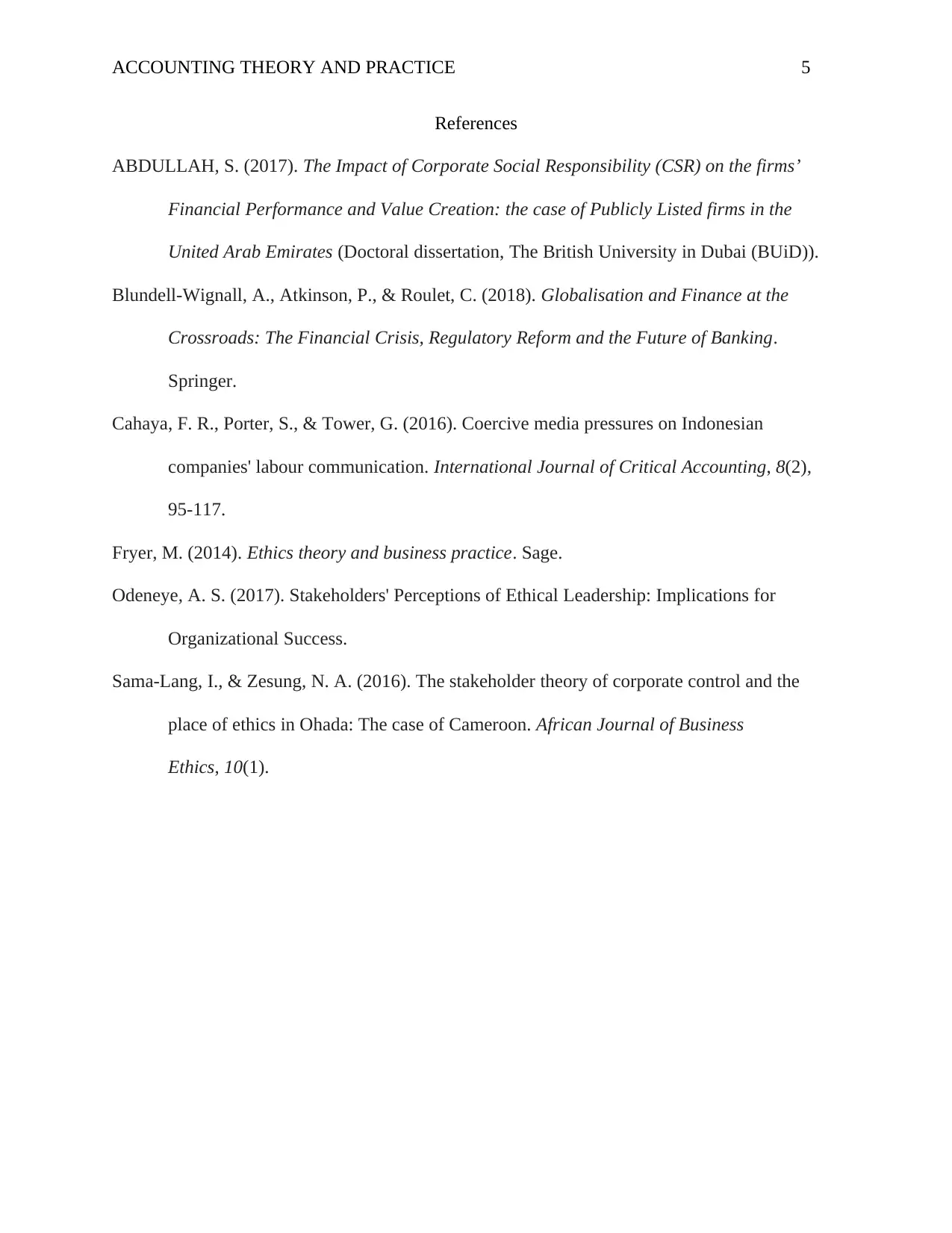
ACCOUNTING THEORY AND PRACTICE 5
References
ABDULLAH, S. (2017). The Impact of Corporate Social Responsibility (CSR) on the firms’
Financial Performance and Value Creation: the case of Publicly Listed firms in the
United Arab Emirates (Doctoral dissertation, The British University in Dubai (BUiD)).
Blundell-Wignall, A., Atkinson, P., & Roulet, C. (2018). Globalisation and Finance at the
Crossroads: The Financial Crisis, Regulatory Reform and the Future of Banking.
Springer.
Cahaya, F. R., Porter, S., & Tower, G. (2016). Coercive media pressures on Indonesian
companies' labour communication. International Journal of Critical Accounting, 8(2),
95-117.
Fryer, M. (2014). Ethics theory and business practice. Sage.
Odeneye, A. S. (2017). Stakeholders' Perceptions of Ethical Leadership: Implications for
Organizational Success.
Sama-Lang, I., & Zesung, N. A. (2016). The stakeholder theory of corporate control and the
place of ethics in Ohada: The case of Cameroon. African Journal of Business
Ethics, 10(1).
References
ABDULLAH, S. (2017). The Impact of Corporate Social Responsibility (CSR) on the firms’
Financial Performance and Value Creation: the case of Publicly Listed firms in the
United Arab Emirates (Doctoral dissertation, The British University in Dubai (BUiD)).
Blundell-Wignall, A., Atkinson, P., & Roulet, C. (2018). Globalisation and Finance at the
Crossroads: The Financial Crisis, Regulatory Reform and the Future of Banking.
Springer.
Cahaya, F. R., Porter, S., & Tower, G. (2016). Coercive media pressures on Indonesian
companies' labour communication. International Journal of Critical Accounting, 8(2),
95-117.
Fryer, M. (2014). Ethics theory and business practice. Sage.
Odeneye, A. S. (2017). Stakeholders' Perceptions of Ethical Leadership: Implications for
Organizational Success.
Sama-Lang, I., & Zesung, N. A. (2016). The stakeholder theory of corporate control and the
place of ethics in Ohada: The case of Cameroon. African Journal of Business
Ethics, 10(1).
1 out of 5
Related Documents
Your All-in-One AI-Powered Toolkit for Academic Success.
+13062052269
info@desklib.com
Available 24*7 on WhatsApp / Email
![[object Object]](/_next/static/media/star-bottom.7253800d.svg)
Unlock your academic potential
Copyright © 2020–2026 A2Z Services. All Rights Reserved. Developed and managed by ZUCOL.





